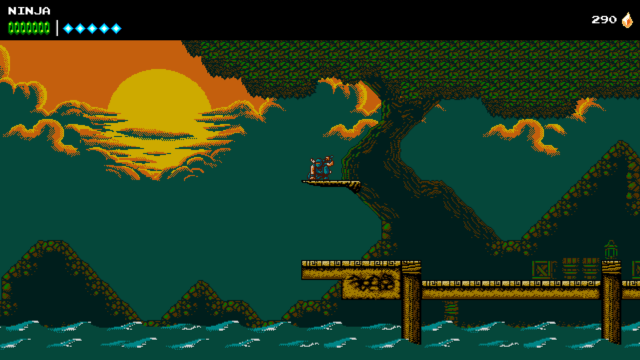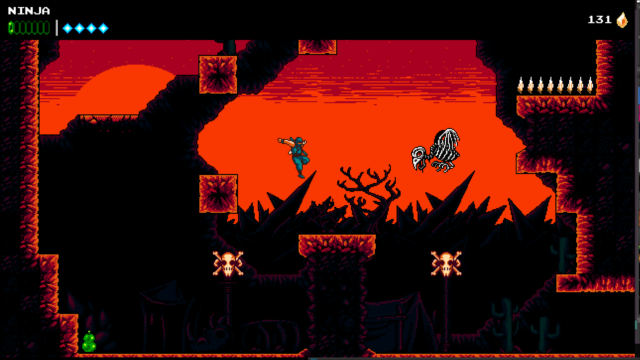Mix of 8 and 16-bit graphics is gorgeous; multiple gameplay mechanics merge into a single, kinetic package; swap between linear and nonlinear exploration is handled perfectly; chiptune soundtrack is super catchy; those Genesis sounds!
The writing is mostly funny, even occasionally hilarious, but at times becomes abrasive
Metroidvania, Metroidvania, Metroidvania. To say that this particular subgenre has become a mainstay of the indie development scene would be an understatement. From Axiom Verge to Dead Cells to Blaster Master Zero, there have been a multitude of Metroidvanias to choose from over the past few years. As a result, what was once an occasional treat has become a burgeoning force within the industry. It’s not a bad thing, certainly, but in order to make a real mark and become noticed, any developer working on a Metroidvania today is going to need to up the ante and deliver something special. Thankfully, The Messenger is something special.
The game stars a nameless warrior living in a post-apocalyptic world that’s been invaded by demons. He’s a member of a clan of reclusive ninjas that await the arrival of “the Western Hero,” a savior who will come and rescue what remains of humanity. After a sudden attack, the nameless ninja watches as his shadow brethren are decimated and he’s all that remains. He’s then tasked with taking a sacred scroll to the top of a mountain and is thus dubbed… the Messenger! It’s good, goofy fun that perfectly suits the tone of the game and the retro vibe it so clearly wants to establish.
The Messenger spends the rest of the campaign making self-deprecating jokes about the various clichés and well-worn tropes that it employs in its storyline. While the nominal Messenger is the star of the game, he shares a great deal of screen time with a robed shopkeeper who helps guide the ninja to his goal. The shopkeeper upgrades the Messenger’s gear and abilities, and also delivers all of the background info regarding the current stage, bosses, and so on. He’s effectively a navigator, but he’s also supposed to serve as comic relief between segments of intense platforming and fighting. The shopkeeper largely succeeds in both regards, but despite some entertaining moments with him, his character ultimately came to be my least favorite part of the game.
To put it succinctly, the writing in The Messenger sometimes tries too hard to be witty. I can’t think of another game where it felt like I was perpetually being sneered at by the writer. There’s a lot of meta fourth-wall breaking humor here, where the shopkeeper makes cracks about some of the more hackneyed elements of The Messenger’s design and storyline (which is of course intentional). It’s certainly funny in spurts, but there are segments that become mystifyingly self-indulgent, such as the optional anecdotes the shopkeeper delivers to the ninja. They’re insanely overwrought and only seem to exist for the purpose of being showy attempts at self-aggrandizing. These moments stand in stark contrast to the pieces of writing that are legitimately fun and entertaining, which is odd given how polished The Messenger is in every other area. I’ll grant that this likely wasn’t the writer or development team’s intent, but that’s how it comes across.

Thankfully, the remaining bulk of this inaugural release from developer Sabotage Studio makes up for any small shortcomings in the writing. The Messenger is a fascinating stab (pun intended) at riffing and expanding upon the trio of NES-era Ninja Gaiden games. Tecmo Koei’s trilogy isn’t the only inspiration here, however, as there are also flashes of Bionic Commando, Shadow of the Ninja, and other classic platformers. The mix is a pleasing one, delivering a delightful pastiche of mechanics including grappling, climbing, double-jumping, and more that arguably set this game head and shoulders with its numerous inspirations. The basic hack-and-slash combat isn’t particularly deep, but it engenders a real sense of power and flows wonderfully. The Messenger is reminiscent of Shovel Knight in that it is very much a modern interpretation of the foundational classics that preceded it.
This is most exemplified by The Messenger’s split game structure which switches up about halfway through the adventure. Initially, The Messenger is quite linear and unfolds one stage at a time. Then, it transitions into a more traditional Metroidvania. The change is jarring but very effective. Suddenly, what were once individual stages become part of an interconnected world with entirely new areas to explore. These additional locations can be reached via the game’s big hook: time travel. Sabotage Studio hit upon the notion of visually conveying the idea that the ninja has moved forward in time by upscaling all of the graphics from 8 to 16-bits. Step into a portal and everything around the Messenger warps into something that would look (and sound) right at home on an SNES or Genesis.

It’s a brilliant twist that is expertly implemented. It helps to explain the heretofore unreachable bits of terrain that suddenly become accessible following the Metroidvania structure swap. What’s more, the visual variety this helps to achieve is spectacular. Between the 8 and 16-bit animations and pixel art, Sabotage Studio has outdone the work of many other contemporary developers. I basked in the seemingly endless array of vistas and intricate details that comprise The Messenger’s world. What’s more, the soundtrack is also fantastic. The chiptunes experience their own evolutionary shift between NES and SNES/Genesis when the ninja moves through time. Along with the sound effects, the clear Genesis influence for the 16-bit sections of gameplay is a welcome break from what has become the norm of leaning on Nintendo hardware for these retro-inspired projects. “Retro” comprises a lot of other platforms, after all.
The Messenger is a real accomplishment for the fledgling Sabotage Studio. There are development teams that work for years trying to come within the same hemisphere of quality that The Messenger comfortably resides at. Its gameplay is both polished and electric, fostering a constant desire to push forward and discover every secret that its world contains. While some of the writing isn’t executed as well as it could be, the sum of The Messenger‘s parts absolutely makes up for this single, flawed fragment. It’s an essential title for anyone’s library of Switch games and I really hope at some point it gets a physical release.




 ShareThis
ShareThis





